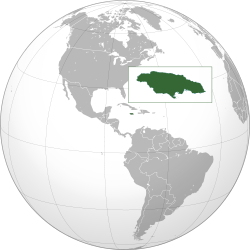Portal:Jamaica
The Jamaica Portal
Jamaica (/dʒəˈmeɪkə/ ⓘ jə-MAY-kə; Jamaican Patois: Jumieka [dʒʌˈmie̯ka]) is an island country in the Caribbean Sea and the West Indies. At 10,990 square kilometres (4,240 sq mi), it is the third largest island—after Cuba and Hispaniola—of the Greater Antilles and the Caribbean. Jamaica lies about 145 km (90 mi) south of Cuba, 191 km (119 mi) west of Hispaniola (the island containing Haiti and the Dominican Republic), and 215 km (134 mi) south-east of the Cayman Islands (a British Overseas Territory). With 2.8 million people,0 Jamaica is the third most populous Anglophone country in the Americas (after the United States and Canada), and the fourth most populous country in the Caribbean. Kingston is the country's capital and largest city. Most Jamaicans are of Sub-Saharan African ancestry, with significant European, East Asian (primarily Chinese), Indian, Lebanese, and mixed-race minorities. Because of a high rate of emigration for work since the 1960s, there is a large Jamaican diaspora, particularly in Canada, the United Kingdom, and the United States. The country has a global influence that belies its small size; it was the birthplace of the Rastafari religion, reggae music (and such associated genres as dub, ska and dancehall), and it is internationally prominent in sports, including cricket, sprinting, and athletics. Jamaica has sometimes been considered the world's least populous cultural superpower. (Full article...) Selected article -
Portland, with its capital town Port Antonio, is a parish located on Jamaica's northeast coast. It is situated to the north of St Thomas and to the east of St Mary in Surrey County. It is one of the rural areas of Jamaica, containing part of the Blue Mountains, where the Jamaican Maroon communities of Moore Town and Charles Town are located. (Full article...)
Did you know (auto-generated)
Selected biography -Winston Foster OD, (1956 or 15 January 1959) better known by the stage name Yellowman and also known as King Yellowman, is a Jamaican reggae and dancehall deejay. He first became popular in Jamaica in the 1980s, rising to prominence with a series of singles that established his reputation. Yellowman is considered to be one of the genre's pioneers and has been credited with "almost single-handedly [creating] the coarse, crude and fearlessly direct sound of today's dancehall." Spearheading the first generation of dancehall deejays, he brought the genre to an international audience. (Full article...)General images -The following are images from various Jamaica-related articles on Wikipedia.
This is a Good article, an article that meets a core set of high editorial standards.
Robert Nesta Marley OM (6 February 1945 – 11 May 1981) was a Jamaican reggae singer, guitarist, and songwriter. Considered one of the pioneers of the genre, Marley fused elements of reggae, ska, and rocksteady in his music and was renowned for his distinctive vocal and songwriting style. Marley's contribution to music increased the visibility of Jamaican music worldwide and made him a global figure in popular culture. Over the course of his career, Marley became known as a Rastafarian icon, and he infused his music with a sense of spirituality. He is also considered a global symbol of Jamaican music and culture and identity, and was controversial in his outspoken support for democratic social reforms. He also supported legalisation of cannabis, and advocated for Pan-Africanism. In 1976, Marley survived an assassination attempt in his home, which was believed to be politically motivated. Born in Nine Mile, Jamaica, Marley began his professional musical career in 1963, after forming the group Teenagers with Peter Tosh and Bunny Wailer, which, after several name changes, would become the Wailers. In 1965, the group released its debut studio album, The Wailing Wailers, which included the single "One Love", a reworking of "People Get Ready"; the song was popular worldwide, and established the group as a rising figure in reggae. The Wailers released an additional 11 studio albums, and after signing to Island Records, the band's name became Bob Marley and the Wailers. While initially employing louder instrumentation and singing, the group began engaging in rhythmic-based song construction in the late 1960s and early 1970s, which coincided with Marley's conversion to Rastafari. Around this time, Marley relocated to London, and the group embodied their musical shift with the release of the album The Best of The Wailers (1971). (Full article...)Selected picture - Sugarcane cutters in Jamaica, 1880s
Selected cuisines, dishes and foods -
Red peas soup is a soup eaten in Jamaica. It is made of kidney beans (known locally as red peas), seasonings such as scotch bonnet pepper, pimento seeds, etc. Traditionally, the broth includes a pigtail. Red Peas Soup is usually eaten with yam and Jamaican dumplings. (Full article...)
More did you know
Selected listsTopicsCategoriesRelated portals
WikiProjectsGeographical:
History and Society:
Tasks
Associated WikimediaThe following Wikimedia Foundation sister projects provide more on this subject:
More portals | ||||||||||






















































